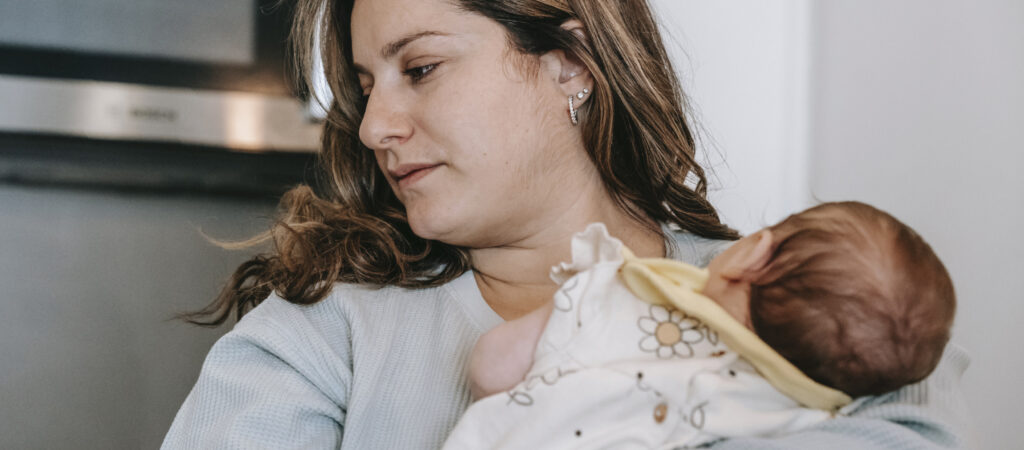How to Know When Your ‘Baby Blues’ Are Really Postpartum Depression

Medically reviewed by Susan Vachon, PA-C on February 24, 2022
It’s totally normal for new moms to be emotional the first few days after giving birth. You’ve just created a new life — you have a right to be a bit sentimental! These “baby blues” are typically attributed to a drastic change in hormones as your body transitions out of a pregnant state.
While the baby blues are normal, the more serious form of sadness known as postpartum depression (PPD) is not. PPD is a mental health condition that can put both you and your baby at risk. To help you better understand the difference, use these tips for knowing whether or not your baby blues may be depression.
Your Mood Swings Pretty Much Swing Only One Way
After you give birth, your hormones immediately start fluctuating. Your estrogen and progesterone level will drop. Some people also see a drop in certain thyroid hormones. The result is that your brain will go a bit haywire for a bit.
Nurx offers prescription treatment for anxiety and depression for as little as $0 in copays or $25 per month without insurance.
These hormones all have varying effects on the cognitive parts of the brain. They can also lead to changes in dopamine and serotonin, two important neurotransmitters responsible for regulating positive feelings and emotions.
As a result, your emotions will swing like a pendulum. You might cry in despair when it’s time for a diaper change but then laugh with joy after your baby winks at you. These mood swings are unpredictable and severe, but they typically bounce both high and low.
That’s not entirely true when it comes to postpartum depression. Instead of getting those emotionally intense highs, you’ll just feel down all the time. Looking at your baby doesn’t bring you uncontrollable happiness. Rather, you might feel scared and like you’ll fail at being a parent.
These feelings of sorrow might make their way into other parts of your life as well. You might look back at your past mistakes and feel like a failure. Or you might look ahead and feel like there’s nothing to look forward to.
Your Baby Blues Seem to Be Lasting a Long Time or Come on After the Fact
After the sudden change in hormones, it makes sense that your body is on emotional overload as it tries to cope. However, after a few weeks, it will adjust to these altered levels, and life should go on as normal. If your emotions aren’t clearing up, then you may have postpartum depression.
PPD can last for weeks to months after giving birth, and in most cases, it’s all-encompassing. Whereas your baby blues will probably just last a couple of hours each day, PPD will make you feel down the entire time you’re awake.
Another key difference to keep an eye out for? Baby blues typically hit right away due to the hormonal changes we mentioned above. But PPD can actually hit a little bit later, up to a month after giving birth.
Your Symptoms Are Preventing You From Living Life or Caring for Your Baby
Sure — it’s not ideal to start crying because your baby spits up on you. But it’s a pretty normal reaction, and you’ll be able to get on with the rest of your day without too much of a hiccup. If you have PPD, that might not be the case.
Symptoms of PPD are way more severe than the typical baby blues, and they make it way harder to take care of your newborn. You might be so depressed that you don’t even have the strength to pick up your child, let alone feed it. And while it’s common for new parents to be tired (with or without the baby blues), sleeping the day and night away is not normal.
Other symptoms that might start out as baby blues but then worsen if PPD develops are feelings of hopelessness and not feeling bonded with your baby. It might be hard to envision a future for you and your family, especially if there seems to be no point to anything. Unfortunately, these feelings can prevent you from feeling a connection with your baby like some other mothers gush about.
You Don’t Want Support From Anyone
Let’s be real — being a new parent is hard. It’s a 24/7 job, and even if you have the baby blues, you’re likely to seek out help from your friends and loved ones. Sure, you might not want to interact a ton or be super social, but you’re not likely to turn down some babysitting support so you can have a few hours off.
With PPD, though, you might completely withdraw from others. Rather than calling up a loved one for help, you’ll stay silent and isolated. This could be because you feel you’re not worth the trouble or because you simply can’t muster the energy for a conversation.
Whatever the case, this type of behavior can be dangerous for both you and your baby. By isolating yourself, you’re probably allowing your negative feelings to become all-encompassing. And if you get so down that you aren’t taking good care of your baby, their health can suffer.
Think It’s Postpartum Depression? See a Doctor
Did you read any of the above symptoms and think… that really sounds like me? If so, you’re not alone. About one in 10 women will experience postpartum depression.
Your next step is to speak with a medical professional for a diagnosis. A doctor will be able to ask you more about your symptoms and see if you have any underlying conditions that could be contributing to your depression. Then, they can prescribe medication, therapy, or other treatment to help you get back to enjoying life with your new little one.
This blog provides information about telemedicine, health and related subjects. The blog content and any linked materials herein are not intended to be, and should not be construed as a substitute for, medical or healthcare advice, diagnosis or treatment. Any reader or person with a medical concern should consult with an appropriately-licensed physician or other healthcare provider. This blog is provided purely for informational purposes.







